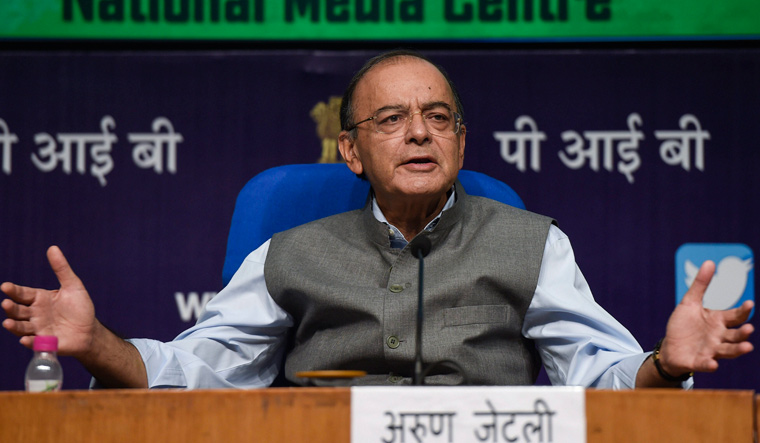The Centre has taken steps to cut prices of petrol and diesel by Rs 2.50 per litre, Finance Minister Arun Jaitley said on Thursday. The decision was taken as domestic fuel prices were on a spike.
"The excise duty will be reduced by Rs 1.50 and OMCs will absorb Re 1. So, a total of Rs 2.50 will be reduced on both diesel and petrol. The price cut will be absorbed by the Centre and oil marketing companies," said Jaitley announcing the decision. The finance minister also urged states to cut the taxes levied by them to ease the pressure on consumers.
Following the Centre's announcement, Maharashtra and Gujarat have also announced a price cut. While Maharashtra has cut petrol prices by an additional Rs 2.50 per litre, Gujarat has slashed prices of both petrol and diesel. Both the states are ruled by the BJP.
"Maharashtra Government also decided to give additional relief of ₹2.5/litre on Petrol to give total benefit of ₹5/litre in the State of Maharashtra," tweeted Maharashtra Chief Minister Devendra Fadnavis.
Maharashtra Government also decided to give additional relief of ₹2.5/litre on Petrol to give total benefit of ₹5/litre in the State of Maharashtra.
— Devendra Fadnavis (@Dev_Fadnavis) October 4, 2018
Gujarat Chief Minister Vijay Rupani tweeted: "Finance Minister Sh @arunjaitley Ji has announced Rs.2.5 cuts in petrol & diesel prices, reciprocating positively to FM’s announcement, the Govt Of Gujarat has also decided to reduce Rs.2.50 on both petrol & diesel. Thus petrol & diesel wd be Rs. 5 cheaper in the State of Gujarat."
Finance Minister Sh @arunjaitley Ji has announced Rs.2.5 cuts in petrol & diesel prices, reciprocating positively to FM’s announcement, the Govt Of Gujarat has also decided to reduce Rs.2.50 on both petrol & diesel. Thus petrol & diesel wd be Rs. 5 cheaper in the State of Gujarat
— Vijay Rupani (@vijayrupanibjp) October 4, 2018
Since mid-August, petrol price has risen by Rs 6.86 a litre and diesel by Rs 6.73—the most in any six-week duration after the daily price revision was introduced in mid-June last year.
A one rupee per litre cut in excise duty results in over Rs 14,000 crore of revenue loss to the centre on an annualised basis.
Almost half of the fuel price is made up of taxes. The centre levies a total of Rs 19.48 per litre of excise duty on petrol and Rs 15.33 per litre on diesel. On top of this, states levy value added tax (VAT)—the lowest being in Andaman and Nicobar Islands where a 6 per cent sales tax is charged on both the fuels.
While a cut in excise duty that the central government levies will impact fiscal deficit, states like Bihar, Kerala, and Punjab are not in a position to cut sales tax (or VAT), they said.
Rajasthan, Andhra Pradesh and Karnataka are among the handful of states which have reduced VAT to give some comfort to consumers.
Mumbai has the highest VAT of 39.12 per cent on petrol, while Telangana levies the highest VAT of 26 per cent on diesel. Delhi charges a VAT of 27 per cent on petrol and 17.24 per cent on diesel.
The central government had raised excise duty on petrol by Rs 11.77 a litre and that on diesel by Rs 13.47 a litre in nine installments between November 2014 and January 2016 to shore up finances as global oil prices fell, but then cut the tax just once in October last year by Rs 2 a litre.
This led to its excise collections from petro goods more than doubling in last four years—from Rs 99,184 crore in 2014-15 to Rs 2,29,019 crore in 2017-18. States saw their VAT revenue from petro goods rise from Rs 1,37,157 crore in 2014-15 to Rs 1,84,091 crore in 2017-18.
The Centre's decision comes in the backdrop of rupee hitting a new lifetime low of 73.81 on Thursday as global crude oil prices breached the $86-per barrel level, near its four-year high. Rising oil prices, deepening concerns about the current account deficit and capital outflows extended the rupee depreciation on Thursday.
Earlier in the day, Prime Minister Narendra Modi had met Jaitley over rising fuel prices and plunging rupee. On Wednesday, Oil Minister Dharmendra Pradhan had called on Jaitley to look at options to mitigate its impact on the economy, sources aware of the discussion said.
Petrol prices were on Thursday hiked by 15 paise a litre and diesel by 20 paise, according to price notification of state-owned oil firms.
The hike pushed petrol price in Delhi to an all-time high of Rs 84 per litre and diesel to Rs 75.45.
Rates of subsidised domestic cooking gas, too, have breached the Rs 500-mark for the first time.
India is the third largest importer of crude oil and rising international oil prices are inflating domestic transport fuel costs in a strong demand environment. Brent, the benchmark for more than half the world's oil, is trading at a four-year high of over $84 per barrel.
Rupee on Thursday dropped to 73.77 against the dollar, resulting in expensive crude imports.
(With PTI inputs)


